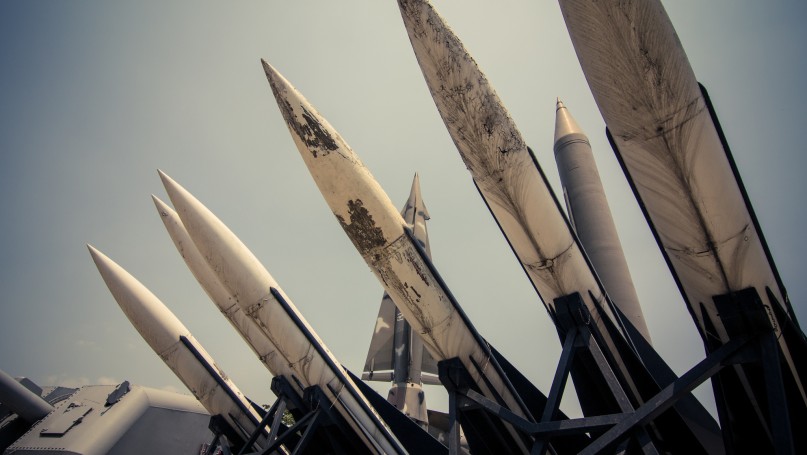
by Archit Singhvi 5 February 2021
There are merely nine countries in the world that have nuclear weapons. Now the quest to make or acquire nuclear weapons is increasing among other countries too. Countries like Iran and Saudi Arabia are defying odds stacked against them to acquire nuclear power. The lucid rationale as to why nations like Iran want to embrace “nuclear arsenals” in their repositories is because of security impediments, the quest to gain prestige and power in this ever-dynamic world, and technological imperatives.
Firstly, Security impediments, it has been perceived that when the survival, security, and sovereignty of the state is at stake, then it further fortifies the pursuit to acquire nuclear weapons to protect the state’s sovereignty and interest. Any state located in a sensitive region menaced by a belligerent enemy will, in all likelihood, be concerned with national security. Such fear empowers the state to explore survival methods, which can either be defensive or offensive, thereby resulting in robust military capabilities. In this way, nuclear weapons empower the state to feel assured.
For example, the “first generation” nuclear powers (Russia, USA, UK, China, and France) and the “second generation” nuclear powers (India, Israel, and Pakistan) procured nuclear weapons because each faced a grave security threat from the rival. Thus, it deters hostile actions, thereby enabling a state to threaten that an attack’s implications can be catastrophic for any aggressor.
Secondly, the Acquisition of nuclear weapon acts as a catalyst for national prestige and power for a state. It also signifies technological sophistication, which establishes a sense of pride in state institutions and their people’s abilities. Nuclear weapons require highly skilled expertise and the latest technological advancements, which help bestow global recognition or great power status upon a state. For India, Britain, and France, prestige was a pivotal factor in acquiring nuclear weapons.
Thirdly, the state purpose of acquiring nuclear weapons is a by-product of technological momentum by the civilians and efficiency-driven nuclear development and research programs. Successful research of research development fortifies and enhances the new horizons of nuclear technology.
The aforementioned reasons are more than enough for countries like Iran and Saudi Arabia to build Nuclear weapons.
Iran desperately wants a nuclear program. Desperation has been such that they are willing to go ahead with the project even though UN and western sanctions have massively hampered its economy. The USA, on the other hand, has been threatening to take military actions. Iran’s dedication to acquire Nuclear weapons comes with an enormous cost. The lucid reasons behind that are:
Iran wants to defend itself from external nemesis it fears earnestly.
USA and Israel have been talking about invading or bombing Iran for years. The USA has had thousands of troops in Afghanistan and Iraq, and both are Iran’s neighbours. It’s pivotal to reiterate that despite the occasional support of China and Russia, Iran largely sees the Middle east against them. Their current supreme leader Ali Khamenei has never been optimistic about its power, and the induction of nuclear weapons in the armoury will add to Iran’s power. A nuclear weapon will act as a deterrence for external forces.
The enrichment of nuclear weapons is of symbolic importance to Iran.
Iran is an overtly proud nation, and that root runs deep for bonafide reasons. It is quite alarming that there has been western interference for decades now. In distinct ways, the nuclear program affirms to itself and the whole world that they are a voguish and sovereign state, which states that they are also at par or equivalent to their other counterparts. It’s also a way to defy what Iran sees as a perennial Western effort to weaken and exploit Iran. The more the world states that Iran cannot build a nuclear program, the more significance it garners to build such programs, which testifies Iran’s nationalism.
Iran sight itself as in a tussle for influence in the region; a nuke will help.
Since Iran came into existence as an Islamic republic in 1979, it has seen the Middle East as a battleground for the influence. Since Saddam’s invasion, Iran leaders fear that belligerent, western-backed Arab can cause massive destruction. Iran also sees pro-USA as inherently hostile, but Iran is also aggressive in the region. Aiding terror groups like Hezbollah and Hamas will act as a dissuasion against USA and Israel threats and acts to showcase its powers. Regarding the struggle for regional power, Iran’s quest for the nuclear weapon will make a lot of sense via which they can stamp their authority.
Iran rules out changes in the Nuclear deal.
President of Iran, Hassan Rouhani, ruled out changes to Iran’s nuclear pact with the world powers and dismissed calls to enlarge the terms of the deal and include regional countries. USA’s president, Joe Biden, raised his support to return to the accord from which former US President Donald Trump had resigned. However, it stated that Iran first resumed full compliance and broadened the deal beyond the nuclear issue. Iran’s rival Saudi Arabia has called for a role in future talks regarding the agreement.
“No clause of the Joint Comprehensive Plan of Action (JCPOA) will change. Know this. And no one will be added to the JCPOA”. Mr. Rouhani said.
Former President Donald Trump pulled out from JCPOA and thrust crippling sanctions on Iran in 2018, keeping a “maximum pressure” against Iran. A year later, Iran responded by slowly suspending its compliance with its pivotal nuclear facets in the deal via which it was promised economic relief for limits on the nuclear programme.
Iran desperately wants to acquire nuclear weapons. Here, everything comes at a cost, i.e., high, but Iran is ready to weather the storm at any cost by fulfilling its quest for nuclear weapons.
